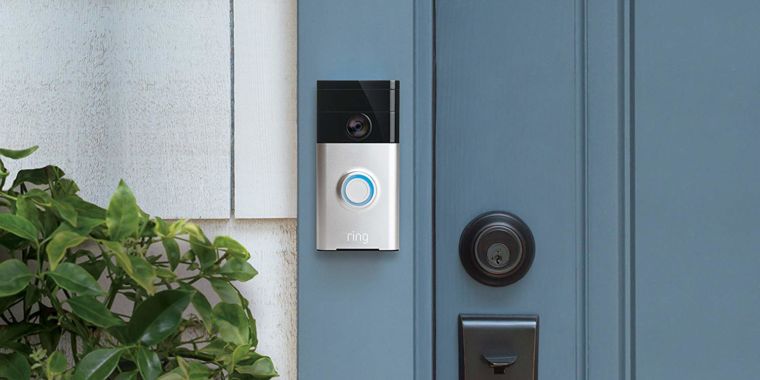Amazon writes scripts for cops to sling Ring home cameras, report says - 4 minutes read
 Amazon writes scripts for cops to sling Ring home cameras, report says
Amazon writes scripts for cops to sling Ring home cameras, report saysAmazon and its subsidiary Ring, maker of home surveillance equipment, have a very cozy relationship with law enforcement. So cozy, according to reports, that Amazon not only requires police departments it partners with to market its product, but the company writes the copy for them.
Gizmodo obtained emails and documents showing Ring pre-wrote messages used by police on social media and in press releases used in at least three states.
Ring also demands police departments in partnerships with it give the company final review on all its statements about Ring products, Gizmodo reports. That arrangement led to the city of Boca Raton, Florida waiting three weeks to announce a Ring partnership already in progress.
Gizmodo also obtained copies of the "press packets" Ring issues to law enforcement partners, which include template social media posts for Facebook, Twitter, and Next-door; template press releases; sets of key talking points to stick to; and scripted answers to frequently asked questions.
Amazon purchased Ring in early 2018 for about $1 billion. "Our mission to reduce crime in neighborhoods has been at the core of everything we do at Ring," the company's CEO said at the time, adding that the acquisition would "accelerate" the company's business.
Consumers buy the camera systems for their homes. Law enforcement can then access a portal site, showing a map of all the cameras in their jurisdiction, allowing them to request footage from specific private individuals as desired. It's the modern version of a neighborhood watch.
(After we published this story, a spokesperson from Ring reached out to specify that law enforcement can only submit video requests "in a given area" when actively investigating a case, that user consent is required for sharing footage, and that law enforcement can't see who received a request or declined to share their footage.)
More than 200 law enforcement agencies around the country have partnerships with Ring, Vice Motherboard reported Monday. Those partnerships provide police departments with portal access and a certain number of free devices, as well as discounts for officers to buy their own. But this deal also essentially require cops to become auxiliary salesmen.
"Officers are NOT sales reps for RING and need to be careful not to suggest this company over other competitors," an officer wrote in one of the emails Gizmodo obtained. But, the officer added, “We want to encourage downloads of the app.”
A separate Motherboard report outlines the agreement Amazon has with police in Lakeland, Florida, which includes the requirement for police to "engage the Lakeland community with outreach efforts on the platform to encourage adoption of the platform/app."
The devices, while convenient for homeowners, may cause more trouble than they solve. Cnet reports today that Ring systems tie up police resources with copious false alarms. The system throws up flags for such threats as cars driving in neighborhoods or people walking nearby, a police representative told Cnet.
The constant notifications users receive, false alarms or not, may also be giving owners the impression that crime is pervasive in their area, even when the opposite is true. This can lead to a sense of "paranoia," as The Outline put it.
The result can be anti-neighborly behavior, promoted by a service that purports to improve your neighborhood.
Privacy risks abound for anyone and everyone who lives in a Ring-filled neighborhood—and of course, the negative effects are not evenly distributed. People of color are far more likely to be targeted by police, and Ring doesn't help.
"Amazon is dreaming of a dangerous future, with its technology at the center of a massive decentralized surveillance network," ACLU attorney Jacob Snow wrote in December.
In ACLU testing, Snow said, the facial recognition software Amazon has proposed adding to Ring frequently churns up incorrect results, especially for women and people with dark skin, making bias more likely, not less.
Source: Ars Technica
Powered by NewsAPI.org
Keywords:
Amazon.com • Police • Bandage • Camera • Amazon.com • Surveillance • Police • Amazon.com • Police • Partnership • Marketing • Product (business) • Company • Gizmodo • Email • Short Message Service • Social media • Press release • Gizmodo • Boca Raton, Florida • Gizmodo • Law enforcement • Social media • Facebook • Twitter • Amazon.com • Company • Chief executive officer • Mergers and acquisitions • Company • Business • Consumer • Camera • System • Law enforcement • Camera • Neighborhood watch • Police • Police • Vice (magazine) • Police • Contract • Police • Sales • Sales • Gizmodo • Application software • Vice (magazine) • Amazon.com • Lakeland, Florida • CNET • CNET • Truth • Sense • Paranoia • Outline (list) • Behavior • Privacy • Causality • Amazon.com • Technology • Decentralization • Surveillance • American Civil Liberties Union • American Civil Liberties Union • Facial recognition system • Amazon.com • Bias •